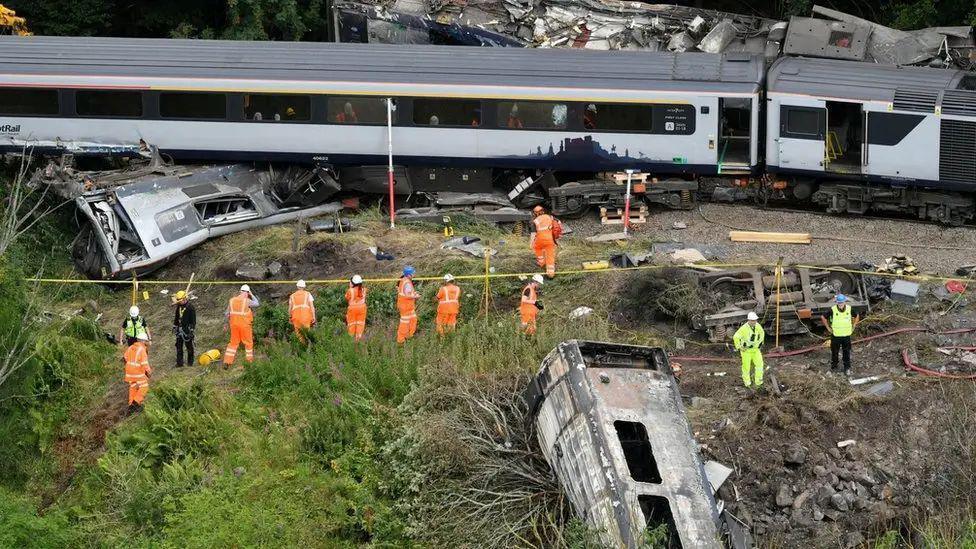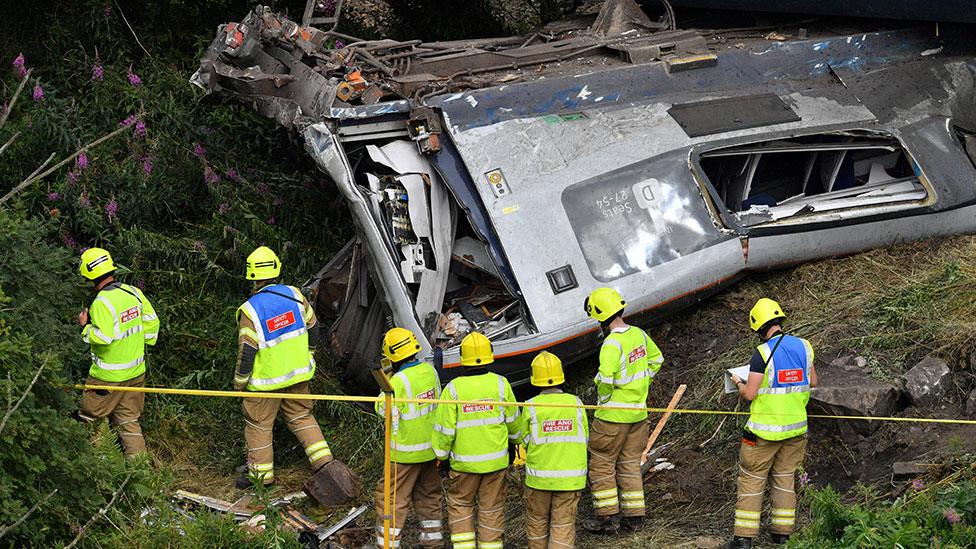Train derailment inquiry may now last under two weeks

Donald Dinnie, Christopher Stuchbury and Brett McCullough died in 2020
- Published
The inquiry into a train derailment which killed three men in the north east of Scotland could now last under a fortnight, a hearing has been told.
The Aberdeen to Glasgow train came off the rails at Carmont, in Aberdeenshire, on 12 August 2020 after it hit a landslide following heavy rain.
Driver Brett McCullough, 45, conductor Donald Dinnie, 58, and passenger Christopher Stuchbury, 62, died in the crash.
Network Rail was later fined £6.7m after admitting a series of failings which led to the deaths.
Aberdeen Sheriff Court heard the evidence in next year's Fatal Accident Inquiry (FAI) could be completed in under two weeks, which is shorter than previous estimates.

Network Rail admitted maintenance and inspection failures around the crash
The FAI was previously set down to start in January.
At the beginning of the year, a hearing was told the inquiry could last about 12 weeks.
In April, that estimate was reduced to about eight to nine weeks.
But in August the Crown said it might not go beyond four weeks in duration.
Court dates were reserved from 26 January through to 13 February, followed by further dates on 23-27 February.
On Monday, Alex Prentice KC, for the Crown, said it was now likely the evidence would be completed within two weeks.
He said this followed extensive talks and a narrowing of issues.
Sheriff Lesley Johnston said "good progress" was being made.
She said a venue for the FAI itself had still to be confirmed, but that it was hoped that could be done soon.
A further preliminary hearing will be held on 22 December.
On the fifth anniversary of the tragedy earlier this year, the RMT union warned "urgent action" was still needed to improve rail safety.
The Rail Accident Investigation Branch (RAIB) annual report for 2024, published earlier this year, revealed eight of its 20 safety recommendations remained "open", external.
These included control room capability and drainage design.
Network Rail said "meaningful progress" had been made.
What caused the Stonehaven derailment?
The train hit a landslide near Stonehaven after heavy rain in an area where a drainage system had been incorrectly installed.
The 06:38 service to Glasgow had been unable to complete its journey due to the conditions and was returning to Aberdeen when the accident happened.
A recording of the driver showed he queried with a signaller if any reduced speed was needed to return north.
He was told everything was fine for normal speed.
The train struck debris from a landslide on the track, derailed, and collided with a bridge parapet.
During a court case in 2023, Network Rail admitted a number of maintenance and inspection failures before the crash.
It also admitted failing to warn the driver that part of the track was unsafe, or tell him to reduce his speed.
At the High Court in Aberdeen, Lord Matthews said no penalty could compensate for the loss suffered by the families of those who died and the people injured.
Law firm Digby Brown later said that a total of nearly £1m in civil actions against Network Rail had been settled.
- Published28 August

- Published12 August

- Published9 October 2023
